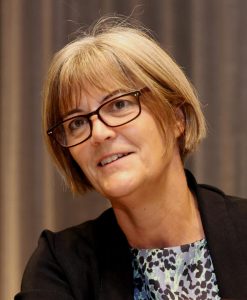Hiroshima Summit 2023: Interview with Julia Longbottom, UK Ambassador to Japan—Summit in A-bombed city can be forum for unity
Nov. 11, 2022
UK to work closely with Japan for nuclear disarmament
by Yumi Kanazaki, Staff Writer
Ahead of the summit meeting of the G7 (Group of Seven industrialized nations), scheduled to take place in Hiroshima City in May next year, Julia Longbottom, the Ambassador of the United Kingdom to Japan, was interviewed by the Chugoku Shimbun in Hiroshima’s Naka Ward. Ms. Longbottom applauded the decision to hold the summit for the first time in the A-bombed city amid the crisis in Ukraine. Ms. Longbottom revealed the willingness of Britain, one of five nuclear superpowers, to cooperate with Japan for making progress toward nuclear disarmament.
What is your take on the summit being held in Hiroshima?
With Russia’s invasion of Ukraine, it is significant that world leaders will gather in the A-bombed city of Hiroshima, the home of Japan’s Prime Minister Fumio Kishida. The summit meeting will serve as a forum for attaining unity on the issue of protection of human rights, democracy, and rule-based international principles, as well as for debating such global issues as food, energy, security, and climate change. The gathering will be an opportunity to overcome the coronavirus pandemic and launch an ambitious plan for the prevention and handling of such infectious diseases.
Russian President Vladimir Putin has hinted at, threatened the use of nuclear weapons.
Russia’s invasion of Ukraine is a brutal attack against a sovereign nation and a serious violation of international law as well as the United Nations Charter. Mr. Putin’s statements concerning the use of nuclear weapons were irresponsible. We welcome Mr. Kishida’s nuclear disarmament proposals (such as the “Hiroshima Action Plan”) and intend to work closely with the G7 summit host nation of Japan.
Have you visited Hiroshima previously?
In 1990, when I was learning Japanese as a young diplomat (second secretary at the British Embassy to Japan), I visited Hiroshima for the first time with my parents, who had traveled all the way from the UK. We visited the Hiroshima Peace Memorial Museum (in the city’s Naka Ward) and came into contact with individual victims’ A-bombing experiences. What I remember most are the paper cranes folded by Sadako Sasaki and a clock that had stopped at precisely 8:15. I came to understand the human damage caused by the bombing.
Does the UK agree with the goal “a world without nuclear weapons”?
As a long-term goal, we will continue our comprehensive involvement. That goal will be realized through a phased approach and multinational disarmament efforts under the Nuclear Non-Proliferation Treaty (NPT) regime.
As the UK and other nuclear powers have increased their reliance on nuclear deterrence, people in Hiroshima have voiced their alarm.
The UK maintains nuclear weapons in preparation for cases in which extreme threats are posed by other nations with no available solution for deterrence. So long as nuclear deterrence is necessary in our security environment, the idea is essential and will likely continue. At the same time, the UK is proud of the consistent achievements we have made in terms of nuclear disarmament.
In reality, the UK’s Ministry of Defense raised the cap on the UK’s nuclear stockpile from 225 to 260 warheads last year.
That was against the backdrop of other nuclear nations, particularly China and Russia, failing to make nuclear disarmament efforts equivalent to those achieved by the UK. To maintain the effectiveness of nuclear deterrence, a balance with other nations needs to be attained.
Do you have a message for the people of Hiroshima?
When my husband and I attended the Peace Memorial Ceremony in Hiroshima last year, what impressed us the most was how hard the A-bomb survivors were working to pass on their experiences to later generations. That history of Hiroshima and Nagasaki should never be repeated. I believe what I can do myself is to make efforts to ensure peace and security through diplomacy.
The Chugoku Shimbun will hold interviews in sequential fashion with the ambassadors to Japan from the European Union (EU) and other nations scheduled to participate in the summit meeting and ask their thoughts about the significance of the gathering in Hiroshima as well as the elimination of nuclear weapons.
Julia Longbottom
Joined UK’s Foreign and Commonwealth Office (FCO) in 1986. After assuming numerous positions, such as Head of the Far Eastern (later China) Department, Minister and Deputy Head of Mission in Japan, and Director for Consular Services, Consular Directorate, Ms. Longbottom has served as the British Ambassador to Japan since March 2021.
(Originally published on November 11, 2022)








